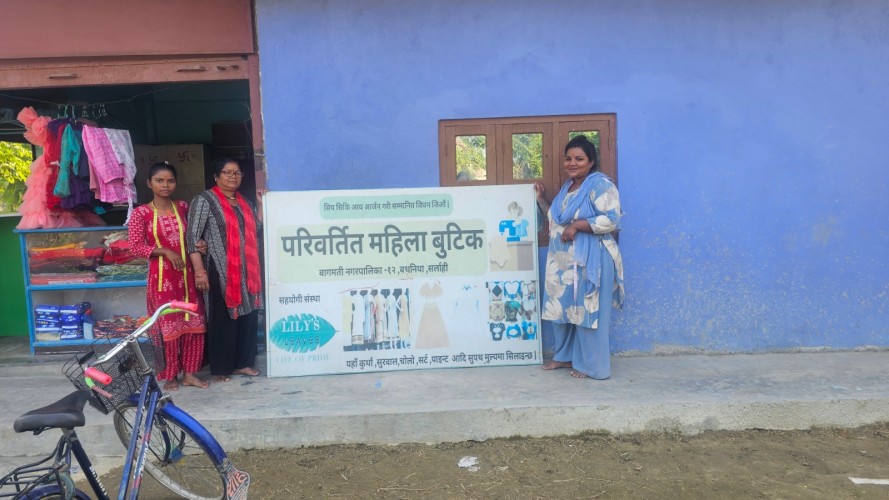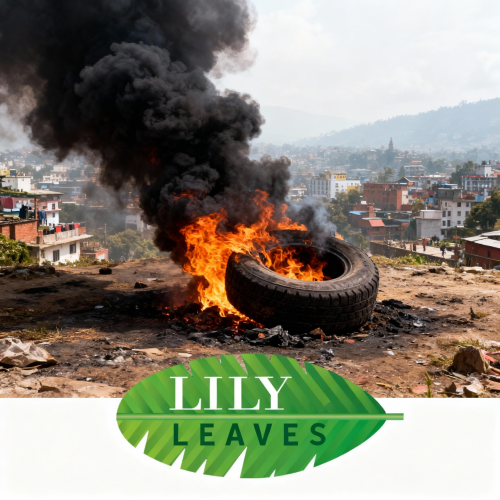




Kathmandu, Nepal — Recent protests across Nepal, especially the Gen G demonstrations, have seen streets filled with thick, black smoke from burning rubber tyres and plastics. Alongside, many young trees and green spaces along roads have been damaged or destroyed. While these acts may express anger, experts warn that their harmful effects on human health, animals, and Nepal’s fragile environment are severe and long-lasting.
Burning just one bus tyre releases about 8.1 kilograms of carbon dioxide (CO2), a greenhouse gas known to increase global warming. It also produces methane and other toxic gases dangerous for our planet. When hundreds of tyres burn in cities like Kathmandu, where trees and green spaces are already very limited, the impact on air quality is devastating.
“The smoke from burning tyres contains harmful chemicals that can cause respiratory illnesses, worsen asthma, and lead to long-term heart and lung problems,” said Dr. Sita Bajracharya, a pulmonologist based in Kathmandu. “These health risks are higher for children, elderly people, and those with pre-existing conditions.”
The problem goes beyond human health. The chemicals released during tyre burning pollute soil and water nearby, affecting animals and plants. Birds, insects, and other wildlife suffer as their habitats shrink due to green space destruction.
“Green spaces are the lungs of our cities,” explained environmentalist Rajan Aryal. “When we burn tyres and cut down trees, we remove nature’s air filters. Kathmandu has already lost much of its greenery, making the air dirty and the city hotter.”
Kathmandu’s green cover has been declining steadily. Trees play a critical role in preventing floods by absorbing rainfall and stabilizing soil. The breaking of trees and destruction of parks during protests worsens flooding and heat waves, which have become more frequent with climate change.
Experts emphasize peaceful and environmental-friendly ways to express opinions. “Protests should not harm the environment that sustains us all,” said Dr. Amrita Shrestha, a climate scientist. “The smoke and toxic gases from burning tyres cause far-reaching damage for our planet and public health.”
In the effort to protect Nepal’s environment, social enterprises such as LilysLeaves.org.np are making an important impact. This organization actively plants trees in cities and rural areas, runs clean-up drives, and educates communities about reducing pollution and conserving biodiversity.
“We work to reduce waste, promote tree planting, and raise awareness about climate change,” said Anil Gurung, coordinator at LilysLeaves.org.np. “Our mission is to create a greener Nepal by involving citizens in protecting nature.”
These efforts provide hope amid rising environmental challenges. The message is clear: the burning of tyres and destruction of green spaces significantly harm human health, contribute to climate change, and threaten biodiversity.
Nepali cities need more trees and clean air, not toxic smoke and destruction. “Protecting our environment is protecting our children’s future,” Aryal added.
For a safer, healthier Nepal, protests and public anger must find peaceful means that do not damage the planet. Supporting local environmental groups and preserving green spaces are crucial steps toward this goal.
“Our environment belongs to all living beings. When we save green spaces and avoid pollution, we save ourselves,” Dr. Bajracharya said.
As communities unite with organizations like LilysLeaves.org.np, there is hope that Nepal can heal its wounds, breathe cleaner air, and sustain its rich biodiversity for generations to come.
332 views
CEO representing Lily Leaves in '9th COMMUNITY CONFERENCE" organized by The British School.
One-Day Workshop At Lily Leaves - 17th June 2023
Lily was joined by Santosh Shah, a former student of the school and winner of BBC's MasterChef.
This act not only empowered the individuals to start their own tailoring businesses
CEO Lily Katuwal and a group of visitors from Lily Leaves Social Enterprises distributed 135 school bags and uniforms in Bandipur, Siraha, demonstrating a commitment to social responsibility and fostering positive change in education for students facing financial challenges.
Volunteer from rato Bangala school Environment club
Explore how Lily’s Leaves empowers women through sustainable fashion, blending ethical craftsmanship with eco-friendly designs for a better future.
Rebuilding Nature in Swayambhu!
Equipped with new skills and gifted sewing machines, they're ready to launch their own businesses or join local enterprises.
Monkeys of Swayambhunath: Addressing Health Challenges with Care and Awareness
30 Grade 9 students from Rato Bangala School keeping Swoyambhu Clean & Green.
Lily Leaves handed out durable bags to Class 1-3 students at Saraswoti and Seti Devi Schools
We recently had the chance to speak at Kathmandu Forestry College (KAFCOL) on the topic “Greening Kathmandu: Urban Forestry through the Miyawaki Method.”
Bringing Life Back to Swayambhunath Religious Forest, a UNESCO World Heritage Site
Empowering Women & Ecosystems: Dhanushadham Wildlife Corridor Project Advances Community-Led Conservation
Recent protests across Nepal, especially the Gen G demonstrations, have seen streets filled with thick, black smoke from burning rubber tyres and plastics.
Grain feeders and water tubs installed in urban forests help retain birds and support ecosystem restoration.
We are overjoyed to share a milestone for our planet and our heritage: the Swoyambhu Religious Forest Reforestation Project - II is now complete!
Together, we can celebrate with joy and responsibility, embracing eco-friendly ways that honor both tradition and Earth.
Seeing their lives transform fills our hearts with pride and joy.